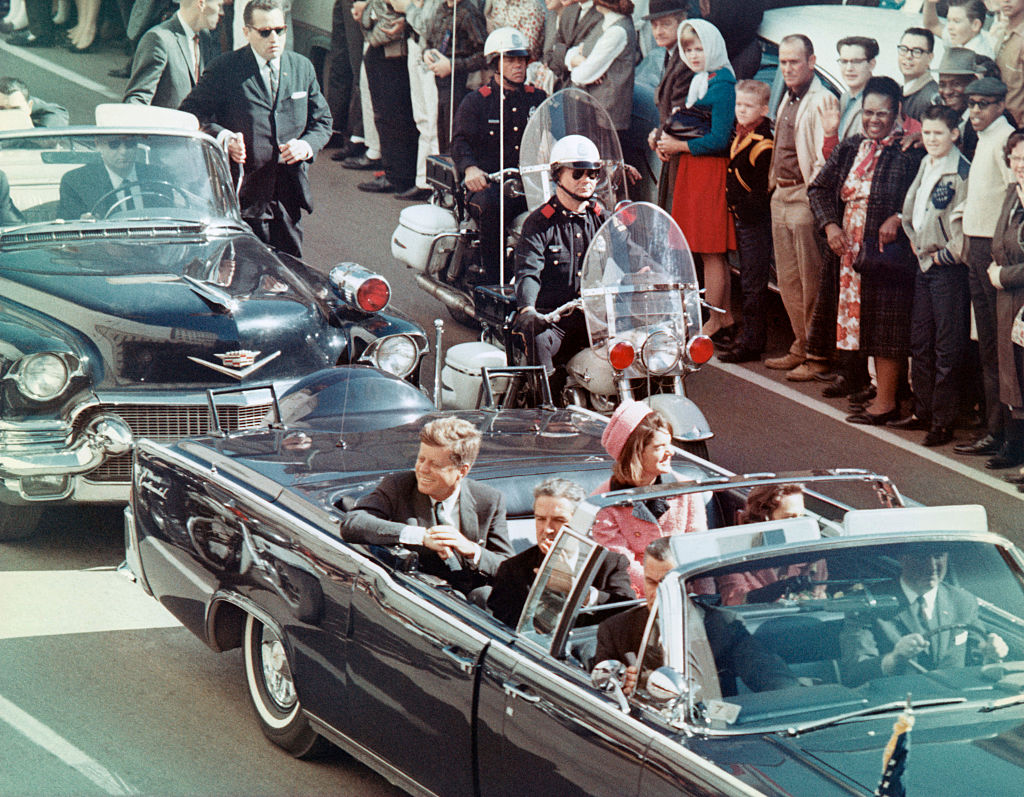What We Know and Still Don’t Know about JFK’s Assassination

This Wednesday marks 60 years since America’s youngest President John F. Kennedy was assassinated on Nov. 22, 1963, in Dallas, Texas, at the age of 46 by Lee Harvey Oswald. He was shot while riding in a car with his wife First Lady Jackie Onassis and Texas Governor John Connally during a tour of the state. Two days later, local nightclub owner Jack Ruby shot Oswald on Nov. 24, 1963.
Sixty years after the JFK assassination, it’s still unclear why Oswald shot the president, fueling countless conspiracies—like whether his successor Lyndon B. Johnson was behind the assassination. (He was not.) The continued fascination over who killed JFK and why helps provide context for the conspiracy theories that continue to dominate American politics today.
The definitive account of what happened the day of the assassination is the report produced by the Warren Commission. Just a week after JFK’s death, Johnson signed an executive order that created the commission, headed by the Chief Justice of the U.S. Supreme Court Earl Warren, to investigate the death of the President. Ten months later, its report confirmed that Oswald fired the shots that killed JFK and wounded Connally, and that there is “no evidence” that Oswald or Jack Ruby were part of a domestic conspiracy or that a foreign government was behind the assassination. The report did not determine why Oswald shot JFK; as TIME reported in 1964, “The explanation of Oswald’s motive for killing President Kennedy was buried with him.”
“I don’t think we fully understood how many people just could not give up the idea that there was a conspiracy,” says Burt Griffin, assistant counsel on the Warren Commission, and author of JFK, Oswald and Ruby: Politics, Prejudice and Truth.
Read more: JFK’s assassination and the conspiracy industry
The killing of the President helped fuel a climate of mistrust in the 1960s that grew with the assassinations in 1968 of Martin Luther King, Jr. and JFK’s brother Robert F. Kennedy, says Larry Sabato, author of The Kennedy Half Century: The Presidency, Assassination, and Lasting Legacy of John F. Kennedy. The ongoing Vietnam War and the Watergate scandal in the early 1970s contributed to a culture of conspiracies. “As a society, we became addicted to conspiracy theories because of the Kennedy assassination,” Sabato says.
Since the President John F. Kennedy Assassination Records Collection Act of 1992, the government has been declassifying documents related to JFK’s assassination. But according to experts on the JFK assassination that TIME talked to, no major revelations have been found in these document dumps in the 60 years since the President was killed.
“No new information has been revealed or exposed that really alter the course of our understanding of what happened,” says Nicola Longford, CEO of the Sixth Floor Museum at Dealey Plaza, a museum all about the JFK assassination located in the building where Oswald shot JFK.
Some eyewitnesses to the JFK assassination are still alive. National Geographic’s new docuseries out Nov. 5 is told through archival footage from the Sixth Floor museum and eyewitnesses from the Associated Press reporter Peggy Simpson to Clint Hill, a Secret Service agent who tried to shield the Kennedys from bullets.
“The 60th anniversary is the last round-year anniversary in which we’re going to have eyewitnesses to the assassination coming up with any news,” says Gerald Posner, author of Case Closed: Lee Harvey Oswald and the Assassination of JFK.
The most prominent eyewitness account that surfaced this year is from Paul Landis, 88, who was on Jackie Kennedy’s Secret Service detail and has opened up about his role on that fateful day in a new memoir that came out in October. Per a Sep. 9 New York Times article, Landis was riding in a convertible behind the presidential limousine and claims that he found an intact bullet in the seam of the limousine’s cushioning, slipped it into his coat pocket, and left it on Kennedy’s stretcher. The bullet then ended up on Connally’s empty stretcher, as a hospital staffer was moving them around. The Warren Commission did not locate the bullet on JFK’s stretcher.
But the fact that Landis has not spoken up for 60 years has raised some questions about his account and how accurate his memory is, as well as the fact that the Warren Commission didn’t interview him. Even the 2023 Times article concluded that “A couple elements of his account contradict the official statements he filed with authorities immediately after the shooting, and some of the implications of his version cannot be easily reconciled to the existing record.”
One big reason that JFK assassination conspiracy theories still persist is because not all of the files pertaining to that fateful day have been made available by the U.S. government. All of them were supposed to be released by 2017, but the release date has been postponed multiple times during the Trump and Biden administrations. Sabato, who does deep dives into the declassified JFK assassination files with his students at the University of Virginia, says there are thousands of pages that are classified and it’s unclear why. “We don’t know what they cover and so that feeds the conspiracies even more,” as Sabato puts it. “What are they hiding?” Posner agrees, but given Oswald never went to trial, he argues, “You’re never going to feel as though the case is really settled.”


